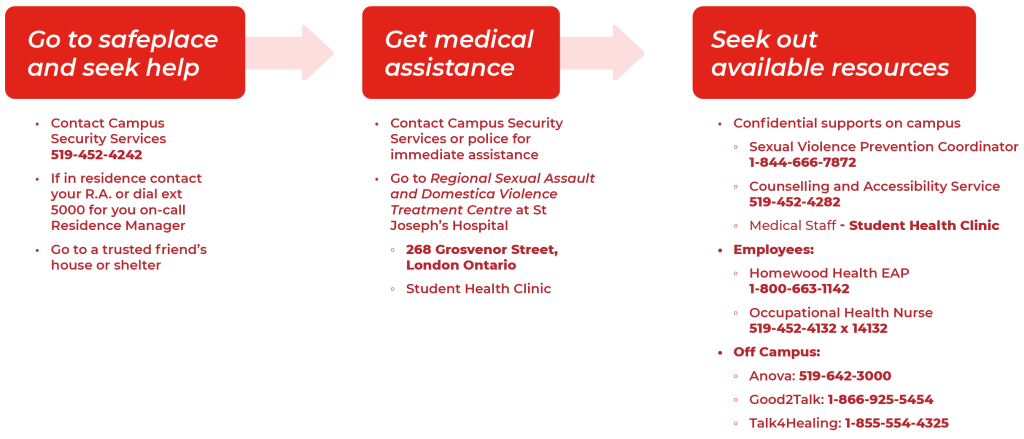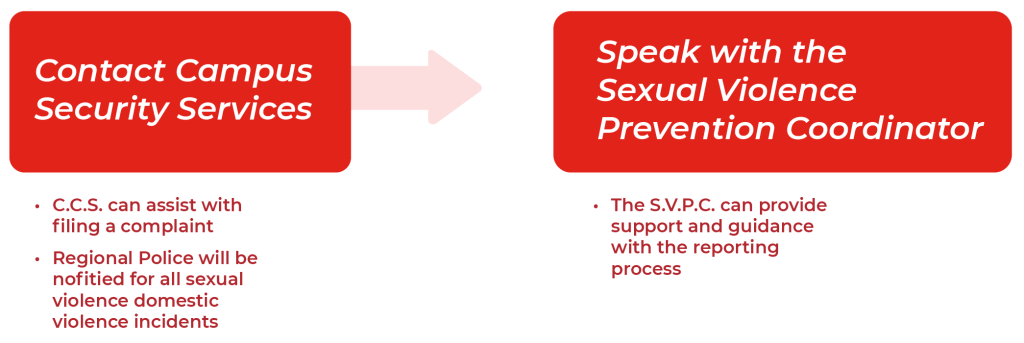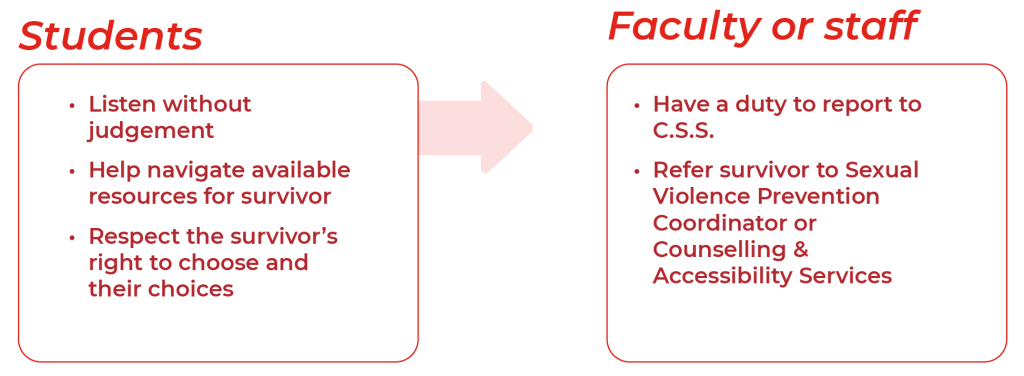Disclosure & Reporting Process
Effects of Sexual Violence on Survivors
Each survivor of sexual violence responds uniquely to their experience. Fanshawe College recognizes the importance of providing personalized, confidential support to meet the individual needs of survivors, including advocacy for academic, housing, and other accommodations.
Impact on Survivors:
Sexual violence can have profound and lasting effects, including:
- Physical and emotional effects: Sleep disturbances, impaired memory, social withdrawal, and loss of interest in previously enjoyed activities.
- Psychological effects: Anxiety, depression, and the potential use of substances as coping mechanisms.
- Academic challenges: Survivors may associate the campus with their trauma, leading to fear, anxiety, and difficulty returning. Encounters with perpetrators can worsen distress, affecting academic performance and sometimes resulting in probation or withdrawal.
Many survivors of sexual violence choose not to report their experiences or disclose them to others formally. Fanshawe College is committed to creating a safe, supportive environment where individuals feel comfortable accessing resources and assistance when ready.
Why Survivors May Hesitate to Disclose or Report:
Survivors may face various barriers to coming forward, including:
- Fear of being blamed, disbelieved, or judged.
- Reluctance to relive their experiences by recounting them repeatedly.
- Feelings of shame, guilt, or self-blame.
- Uncertainty about what behaviours constitute sexual violence.
- Fear of retaliation from the perpetrator.
- Concerns about cultural stigma, ostracization, or stereotypes.
- Worries about potential sanctions related to drug or alcohol use during the incident.
Challenges in the Reporting Process:
- Confidentiality concerns: Survivors may fear public scrutiny or loss of privacy.
- Control over decisions: Survivors might feel that reporting or disclosing could lead to decisions being made by the college or law enforcement without their full input.
Fanshawe College’s Commitment
- Survivors have the right to disclose on their own terms and timeline, whether immediately after an incident or months or years later.
- Fanshawe will provide support, belief, and respect throughout the process, whether survivors choose to report or confidentially disclose formally.
- Formal reporting allows Fanshawe to address respondents appropriately and ensure access to resources, education, and training for all parties involved.
- Fanshawe strives to empower survivors by offering compassionate support and maintaining a safe campus environment where everyone’s voice is respected.
Reporting and Responding Protocol
If you have experienced or been affected by Sexual Violence or Gender-Based Violence, follow this protocol:

Image Description
The image outlines a three-step response guide for individuals experiencing sexual violence:
- Go to a safe place and seek help
- Contact Campus Security Services: 519-452-4242
- If in residence, contact your R.A. or dial extension 5000 for the on-call Residence Manager.
- Go to a trusted friend’s house or a shelter.
- Get medical assistance
- Contact Campus Security Services or police for immediate assistance.
- Go to the Regional Sexual Assault and Domestic Violence Treatment Centre at St. Joseph’s Hospital: 268 Grosvenor Street, London, Ontario
- Visit the Student Health Clinic.
- Seek out available resources
- Confidential supports on campus:
- Sexual Violence Prevention Coordinator: 1-844-666-7872
- Counselling and Accessibility Service: 519-452-4282
- Medical Staff – Student Health Clinic
- Employees:
- Homewood Health EAP: 1-800-663-1142
- Occupational Health Nurse: 519-452-4132 ext. 14132
- Off-Campus Resources:
- Anova: 519-642-3000
- Good2Talk: 1-866-925-5454
- Talk4Healing: 1-855-554-4325
- Confidential supports on campus:
Each section is highlighted in red with clear arrows indicating progression from seeking safety to accessing resources.
Campus Security Services are required to report all allegations of sexual violence and intimate partner violence to the Regional Police Service. Survivors have the choice of whether they participate in either investigation.
Filing a Formal Complaint

Image Description
This image provides guidance on reporting sexual violence incidents in two main steps:
Step 1: Contact Campus Security Services:
- The Campus Security Services (C.C.S.) can help with filing a formal complaint.
- Regional Police will be notified of all sexual violence and domestic violence incidents.
A red arrow pointing to the right connects to the next step.
Step 2: Speak with the Sexual Violence Prevention Coordinator (S.V.P.C.)
- The S.V.P.C. can offer support and guidance throughout the reporting process.
Both steps are highlighted in red rounded boxes, using white italic text for the headers and regular red text for the bullet points.
Survivors are not required to file a formal report in order to access any support, services and resources.
Fanshawe’s Reporting x Disclosure Process
Many survivors of sexual violence choose not to report their experiences or disclose them to others formally. Fanshawe College is committed to creating a safe, supportive environment where individuals feel comfortable accessing resources and assistance when ready.
Fanshawe College offers two processes for addressing sexual violence and gender-based violence: Disclosure and Reporting. Survivors can choose which option to pursue and when to access support services.
What is a Disclosure?
Definition: A disclosure is a process designed to connect survivors of sexual violence or gender-based violence with the necessary support services.
Key Features:
- Disclosures are not formal reports.
- They focus on providing access to resources on campus and in the broader community.
- The goal is to offer support without pressuring survivors to pursue a formal investigation.
Disclosure of Sexual Violence
If someone discloses allegations of sexual violence:
If Someone Discloses Allegations of Sexual Violence. Image by Freddy Vale, CC BY-NC-SA 4.0 (Click to Enlarge)
Image Description
This image outlines appropriate responses when someone discloses an experience of sexual violence, with separate guidance for students, faculty or staff:
Students
- Listen without judgment
- Help navigate available resources for the survivor.
- Respect the survivor’s right to choose and honour their decisions
(A red arrow points right to the next section.)
Faculty or Staff
- Have a duty to report the disclosure to Campus Security Services (C.S.S.)
- Refer the survivor to the Sexual Violence Prevention Coordinator or Counselling & Accessibility Services.
Each group’s responsibilities are contained in red-bordered boxes with bold red section headings and bullet points written in plain red text. The layout uses a left-to-right flow indicated by an arrow.
What is a Report?
Definition: A report involves sharing detailed information about an incident with the intent to initiate a formal process.
Purpose:
- Reports are formal procedures aimed at involving Fanshawe College or the Regional Police Service.
- They typically lead to investigations or interventions to address the incident.
Key Difference Between Disclosure and Report
Definition: A report involves sharing detailed information about an incident with the intent to initiate a formal process.
Disclosure: Access to resources and support without the obligation to pursue legal or formal action.
Report: Formal documentation intended to trigger an investigation or intervention process.
Fanshawe respects each survivor’s autonomy in deciding whether to disclose or report. Regardless of the choice, the college is dedicated to providing unwavering support, belief, and respect. Survivors will be met with compassion and guidance every step of the way.
Witness of Sexual Violence
If someone witnesses sexual violence:

Image Description
This image outlines the roles and actions for students, faculty, staff, employees, and contractors in responding to incidents of sexual violence:
Students
- Encouraged to contact Campus Security Services (C.S.S. 519-452-4242) or 9-1-1 immediately for assistance.
(An arrow points right to the next step.)
Faculty, staff, other employees, and contractors
- Have a duty to report all incidents and suspected incidents of sexual violence to Campus Security Services.
(Another arrow points right to the final section.)
Faculty, staff, other employees, and contractors
- Counselling and Accessibility Services (for students)
- Human Resources/Employee Assistance Program (for employees)
- Good2Talk
Each group’s responsibilities or support options are shown in red-outlined boxes, connected by light red arrows indicating the flow of action.


